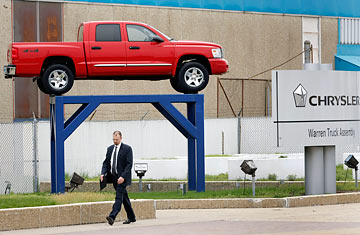
A Chrysler worker exits from the Chrysler Warren Truck Plant in Warren, Michigan.
Sergio Marchionne, the gifted executive who saved Italy's Fiat Group from a destructive meltdown earlier in the decade and then convinced the Obama Administration that he could revive the bankrupt Chrysler Group LLC, tried on Wednesday to dispel speculation that the struggling automaker was beyond help. "We want Chrysler to become a strong public company," said Marchionne, who was dressed in his trademark professorial sweater, as he opened an elaborate presentation of the struggling automaker's business plans for the next five years, which emphasize blending Fiat's small-car and small engines technology with Chrysler's muscular Jeeps, trucks and big cars.
As he presented the plans, Marchionne said that Chrysler's financial position is now stronger, following its trip through bankruptcy and a dramatic restructuring that cut more than 18,000 salaried jobs. One benefit: Chrysler's cash reserves have increased from $4 billion to $5.7 billion since the company emerged from bankruptcy in June. "Chrysler was actually profitable on an operating basis in September," Marchionne said as he opened the meeting outlining Chrysler's 2010 to 2014 business plan.
"In addition, the new Chrysler is incredibly cheap. We're working at conserving cash," he said. Scott Garberding, the head of manufacturing, added that the goal is to cut operating costs by 8% and boost productivity by 10%. "We're eliminating every form of waste," he said. Chrysler also plans to share more suppliers with Fiat. "It allows us to create joint savings," said Garberding.
Marchionne's hands-on style has re-energized Chrysler's managers. "He has literally breathed new life into our company," said Ralph Gilles, who heads the company's design office as well as Dodge marketing.
But not everyone is enthusiastic, and doubts about Chrysler's future were reinforced Tuesday when the company reported a stunning 30% drop in sales for October. By contrast, both the newly profitable Ford Motor Co., and General Motors Corp., which had followed Chrysler into bankruptcy, reported modest sales increases during what was the best month for new cars sales in more than year. "The industry showed signs of improvement this month, which is a trend we expect to continue for the remainder of the year," said Fred Diaz, the top executive in Chrysler Sales Organization, as he scrambled to put a good face on his company's collapsing sales.
Chrysler has introduced only one new vehicle this fall, the Ram heavy truck, and the next new vehicle, the redesigned 2011 Jeep Grand Cherokee, won't appear until next spring. Facing a dearth of new products, Chrysler hands blame the company's previous owner, Cerberus Capital Management LLC, for slashing the product development budget in a failed bid to reach profitability. But it's more than just a lack of new vehicles plaguing the automaker; it's also the vehicles it has in hand. "Chrysler continues to struggle," Consumer Reports said earlier this month. "More than one third of Chrysler products are much worse than average," the magazine's editors noted.
"Chrysler dealers are going to have to rely pretty heavily on selling minivans and trucks," says Brad Coulter, a consultant with O'Keefe & Associates in Bloomfield Hills, Mich. Minivans and trucks have been Chrysler's most successful and profitable vehicles for several years. But the uneven lineup is stirring anxiety among Chrysler's partners. "Suppliers are always looking for more volume but they are going to have to weigh the extra volume with risks inherent in working with Chrysler," Coulter says. Chrysler, for its part, is promising to pay suppliers faster.
Chrysler is also continuing to get support from credit unions. More than 2,000 credit unions in all 50 states have been promoting the "Invest in America" discounts on Chrysler products.
Meanwhile, the Government Accounting Office said in a new report issued this week that the Obama Administration should slow down any plans to dismantle the Auto Task Force it put together last winter. Given Chrysler's remaining challenges, that sounds like a good idea.
